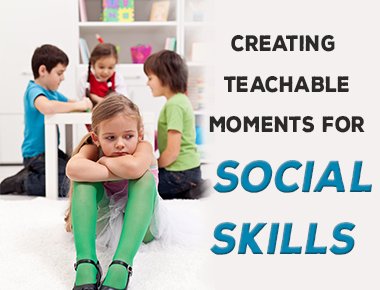
The same holds true for teaching social skills. Social skills give kids a wide range of benefits.

Assist a child in developing their awareness of social norms and to master specific social skills eg.
Teaching a child social skills. How To Teach Social Skills at Home or in the Classroom 1. Explain all the ins and outs of different social situations to your child. Social skills dont come easy to many people so remember to be patient.
Your child might need to be. 7 Most Important Social Skills for Kids Benefits. Social skills give kids a wide range of benefits.
They are linked to greater success in school and better. A willingness to share a snack or share a toy can go a long way to helping kids make. This includes teaching him or her social skills.
While your child is an infant they are constantly observing all that is happening around them. 2 101 WAYS TO TEACH CHILDREN SOCIAL SKILLS Learning ObjectiveTo learn more about each group member. To recognize that although people have different interests they are alike in many ways Skill.
Social communication social awareness Ask the children to look around at the other group members noticing ways they are different and ways they are alike. 6 Simple Strategies to Teach Social Skills When it Doesnt Come Easy 1 Educate Yourself The first step in teaching a child who struggles with social skills is to educate yourself on the possible reasons behind their lack of skills. Is it a behavior management problem a communication problem or a problem with sensory integration.
Talking effectively interacting with strangers starting a conversation listening getting along being responsible for their behaviour making friends and keeping them too dealing with uncomfortable situations teasing bullying awkwardness or unpopularity bonding interacting accepting and finding acceptance empathizing and giving compliments etc. Assist a child in developing their awareness of social norms and to master specific social skills eg. Taking turns in a conversation using appropriate eye contact verbal reasoning understanding figurative language.
Develop appropriate social stories to help teach the child about how to. Any game such as Monopoly Life Trouble Connect Four Go Fish or Uno can teach your child social skills such as cooperating with others listening following directions waiting ones turn and dealing with losing. Many children have trouble losing so practicing losing at home will help prepare them for when they lose at school or in the community.
Get tips for teaching your child conversation skills. Struggling socially can take a toll on kids self-esteem and cause them to feel isolated. It helps them to know that everyone struggles with something and that social skills can improve.
Learn how to give praise that boosts self-esteem. The same holds true for teaching social skills. We need to provide students with opportunities to learn and practice their social skills.
An effective method of practice is through role-playing. Teachers can provide structured scenarios in which. TeachTown Social Skills guides younger children ages 412 through an interactive curriculum with the goal of teaching socially appropriate behaviors.
TeachTown is designed for children with special needs as the game targets five behavioral domains. The types of skills required to care for and advocate for oneself and others self-regulation responsibility empathy and discipline among others are becoming increasingly central to the work of schools and teachers and increasingly relevant to the lifelong success of students. This book contains a range of worksheets which are designed to teach social skills to many different types of children particularly those with social problems.
Often labeled as having a social skills deficit these children may be considered aggressive socially isolated or shy. The key to teaching your children social skills is to think about what you think is important and focus on that. There are various areas that you may like to consider.
Our page on Developing Interpersonal Skills in Children suggests some suitable areas to cover. Practice is essential for maintaining social skills. Role-playing is a great way to give students an opportunity not only to practice the skills they are learning but also to teach students to evaluate each others or their own performance of skills.
Besides having fun which has value in itself children learn social skills that include. Communication cooperation problem-solving and perspective taking. Research shows that social skills help children succeed in school and in life too.